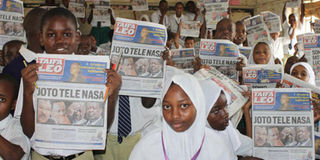As Kiswahili spreads its wings across borders, let’s embrace it

Sacred Heart Primary School, Mombasa County, pupils display Taifa Leo newspaper on March 22, 2017, which is being used to promote Kiswahili language. PHOTO | FILE | NATION MEDIA GROUP
What you need to know:
Some journalists could hardly express themselves in Kiswahili, a language that defines Kenyans.
With State House having appreciated the value of Kiswahili in nation building and development, public officers and private sector players need to accommodate the language.
With the ongoing integration of the East African region, Kiswahili is key to bringing together the bloc’s member states.
Watching some journalists struggle with how to frame some questions in Kiswahili to the deputy State House spokesperson, Ms Kanze Dena, during her debut press briefing was a spectacle.
Some journalists could hardly express themselves in Kiswahili, a language that defines Kenyans. It was a clear indication that, despite being the national and an official language in Kenya, Kiswahili is yet to be fully appreciated by the people who should be at the forefront of championing it.
Some members of the ‘Fourth Estate’ resorted to English. But even then, the former veteran Kiswahili television news anchor remained firm. Needless to say, she tackled the questions eloquently in fluent Kiswahili.
That was a wake-up call to the journalists and the rest in the communication industry that there is a paradigm shift from when English, or the “Queen’s language” as it’s otherwise known, was the in-thing.
With State House having appreciated the value of Kiswahili in nation building and development, public officers and private sector players need to accommodate the language.
In the Constitution, Kiswahili is, alongside English and Kenyan Sign Language (KSL), an official language in public offices, including Parliament.
EMBRACED KISWAHILI
President Uhuru Kenyatta’s administration has embraced Kiswahili by hiring employees, including communicators and journalists, from the Kiswahili world.
They include Ms Dena and Ms Munira Muhamed, who was, until recently, the deputy State House spokesperson and now heads the Presidential Library.
Ms Munira was a television reporter while Ms Dena co-anchored the weekend bulletin with Ms Lulu Hassan.
It is important to note that 80 per cent of Kenyans converse in Kiswahili in their daily activities and, hence, the need to incorporate it in official communication, especially in the office and business set-up, to enhance service delivery.
Communication being a key component of everyday life, a number of organisations and business entities, when hiring communicators, prefer those with a good command of both English and Kiswahili.
CONVERGENCE
Journalists — especially in the broadcast industry, where there is convergence in the newsrooms — need to be well equipped with the language to effectively articulate issues that touch on the mwananchi.
When the President recently launched the multi-billion-shilling Dongo Kundu Bypass in Mombasa County, the contractor, who is of Asian origin, surprised those present when he spoke in Kiswahili.
But he is not the only foreigner who has mastered Kiswahili. US Ambassador to Kenya Kyle McCarter is fluent in Kiswahili, having been in the country for many years doing charity work. Others include his Japanese counterpart Toshitsugu Uesawa and former German envoy Andreas Peschke.
The last two had never been to Kenya before their diplomatic posting and they revealed in media interviews that they learnt it immediately they arrived since they had a passion for the language.
Kiswahili has spread widely in the region. Millions of people speak the language in Uganda, Burundi, Rwanda, the Democratic Republic of Congo and even South Sudan.
SCHOOL CURRICULUM
This, definitely, disproves the popular saying in East Africa that Kiswahili was born in Zanzibar, grew up in Tanzania, fell sick in Kenya, died in Uganda and was buried in Congo.
With the ongoing integration of the East African region, Kiswahili is key to bringing together the bloc’s member states.
Uganda’s National Curriculum Development Centre (NCDC) has finalised its 2017 secondary school curriculum, which includes Kiswahili as a compulsory subject alongside English. An overhaul of the secondary school curriculum to include Kiswahili saw the condensing of 43 taught subjects into eight core “learning areas” (the new term for “subjects”).
In Kenya, Kiswahili is a compulsory subject at both primary and secondary school level. A number of universities also teach it at the bachelor’s and master’s degree level with Kiswahili for Journalists unit taught to undergraduate communication students.
Mr Nyongesa, a senior corporate communication officer at the National Transport and Safety Authority (NTSA), is a former Kiswahili television news editor at Nation Media Group. [email protected]. Twitter: @nyongesaanthony




